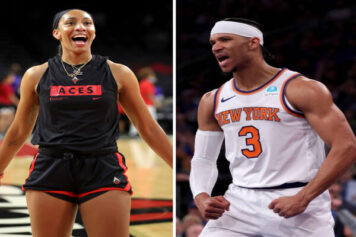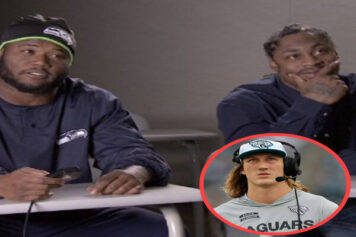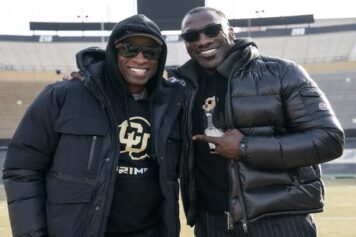April 4th is the 50th anniversary of the assassination of Dr. Martin Luther King, Jr, and HBOs documentary King in the Wilderness takes a candid look at the emotions, thought process and mindset of the storied civil rights leader during the year leading up to his death. Directed by Peter Kunhardt, King in the Wilderness boasts a plethora of intimate interviews with some of Dr. Kings most trusted friends and advisers, as well as rarely seen footage of his time in Chicago and Watts.
Last week, The Shadow League attended the premiere at storied Riverside Church in Harlem, New York. Historic on its own, Riverside Church was also the location of Kings storied Beyond Vietnam speech. Heres what the principal players behind the project had to say about the film while walking the red carpet.
The Shadow League: What were your initial thoughts on this project?
Peter Kunhardt: My initial thoughts were, as a filmmaker who has stumbled over bits and pieces of the King legacy over the years, I knew there was a really important, really big story to tell. Even though there are many other King films, I didnt feel that the essence of the man had been captured. It was a very exciting thing to still be finding original material and telling stories about the man that are not known.
TSL: What impact do you think this film will have on our idealism of Dr. King?
PK: Unfortunately, I think a lot of his message died when King died. The movement began to scatter, and I think that, because it became unpopular to have a non-resistant, peaceful approach, it was sexier to follow black power and that direction of the movement. I think he has been gently forgotten and I think its time that we remember him.
King In The Wilderness Official Trailer (2018) | HBO
Coming in April, this documentary follows Dr. Martin Luther King Jr. during the last few years of his life, from the vital role he played in the Voting Rights Act of 1965 to his assassination in 1968. #HBO #HBODocs Subscribe to the HBO YouTube Channel: https://goo.gl/JQUfqt Don’t have HBO?
Where does MLKs legacy stand today?
PK: I think we left Martin Luther King as a statue in Washington DC and I think that he needs to be humanized. He needed to be a real man with flesh and blood. We need to remember the devils that haunted him, as well as the successes he had. I think he becomes much more of a role model if we establish that he was a real person.
TSL: In the film, theres a little-known clip of his trip to Watts in which he appears beleaguered and set upon on all sides.
Director Kunhardt:
Thats a good observation. He was tired. He didnt want to make that trip. He didnt want to do it but he felt an obligation to the people who had supported him. But you could see how tired he was, and you can see how resistant some in the audience were. Its like Here are people that you would think would want to hear what I have to say, and theyre just making fun.
HBO has let us put all our interviews online. So, youll see in the film, you can see the selects we use online for free.
King in the Wilderness clip – Harry Belafonte
Courtesy of HBO comes a clip from the upcoming MLK Doc “King in the Wilderness”
TSL: What was your biggest takeaway from this project?
Producer Trey Ellis: What I like is that we didnt sugarcoat anything. Heres this guy who people want to remember has a holiday. The way we put it together, were showing King as he was at the moment. As you just saw, people were not reverent to him, black or white.
What I thought when I saw the footage is, I see the struggle, I see despair. He just had a light of hope. We talked a lot about his depression. But, publicly, he had no choice but to be hopeful. Publicly, he had no choice but to fight on and keep going. Thats why he kept going because he had no choice but to keep going.
The Shadow League on Twitter
Martin Luther King Jr. Civil Rights Icon. American Hero. Happy #MLKDay
Pulitzer Prize-winning King biographer Taylor Branch on his contribution to the film.
Pulitzer Prize-winning author Taylor Branch: Not in digging up the footage, because I started working on these books that they use for the movie back in 1982. It was very hard then because the film was predigital. My working theory is that, beyond the technology, cultures preserve things that they want to preserve, and forget about the things they dont. Therefore, a lot of these things were not in the library, thats why I had to do all these interviews, the ones that are interviewed in the film. People like Harry Belafonte, and Andy Young, and Joan Baez, and Diane Nash, and on and on.
My role was to help them frame the story. Which part of King do you want to tell? And I hope its not I Have A Dream because everybody thinks they know that. Even if they dont know it, they think they know it. But they dont know THIS part; Chicago and the vicious racism in the north, how determined Dr. King was in showing America that the race issue never was and never had been solely about the south. He had to show that to a country that was looking for any reason to stop talking about race for good. My role was to help frame them and help secure the interview subjects and do some of the interviews.
I think most of these people, like Harry and Diane Nash, are more impressed now with how steadfast he was in the end to his commitment to nonviolence. Its a great paradox because of a lot of people see Harry as someone who doesnt suffer fools and has a militant personality. Yet, he easily squares that will nonviolence because he said Kings thinking about it was so profound. Thats something thats lost. One of the poorest things that American media does is address nonviolence because if it bleeds it leads. Thats about as sophisticated as the media discussion gets. Im hoping that one of the things that will come out of this film thinking if we really dont like violence then why dont we respect nonviolence more?
TSL: What do you think of nonviolence without strategy and long-term commitment?
Taylor Branch:
Thats why whats missing, and I hope we can get here, is the commitment in the long run. I see King in parallel as a modern founding father who spoke about systematic oppression and tried to move everything toward equal citizenship. Youre right, it requires strategic thinking, principled thinking, sacrifice and, in my view, nonviolence. He was frustrated during his career. He would say You think of nonviolence as vegetarians and weird people who wont step on insects, but you believe in votes. Your system is built on votes. You believe in nonviolence if you believe in votes. Why dont people understand that?
Im hoping we can get more intellectual. Even on college campuses, I think the relationship between nonviolence and violence is one of the most interesting things going. But you have very few people thinking about it at universities. I had a teacher named Hannah when I was in graduate school, and that was one of her themes. She says were always taught that violence and power and synonyms and that violence is the ultimate form of power. But, she said, in an interdependent world violence and power are opposites were still hooked on the old world. And I think Dr. King knew that.
King in the Wilderness debuts April 4 on HBO and provides an intimate look into Dr. King that reveals a man who was tired, set upon by enemies and allies alike, but was resolute in continuing his work.



